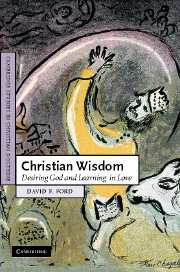Book contents
- Frontmatter
- Contents
- Acknowledgements
- Introduction: theology as wisdom
- 1 Wisdom cries
- 2 A wisdom interpretation of scripture
- 3 Job!
- 4 Job and post-Holocaust wisdom
- 5 Jesus, the Spirit and desire: wisdom christology
- 6 Learning to live in the Spirit: tradition and worship
- 7 Loving the God of wisdom
- 8 An inter-faith wisdom: scriptural reasoning between Jews, Christians and Muslims
- 9 An interdisciplinary wisdom: knowledge, formation and collegiality in the negotiable university
- 10 An interpersonal wisdom: L'Arche, learning disability and the Gospel of John
- Conclusion: love's wisdom
- Index of citations
- Subject index
Introduction: theology as wisdom
Published online by Cambridge University Press: 22 September 2009
- Frontmatter
- Contents
- Acknowledgements
- Introduction: theology as wisdom
- 1 Wisdom cries
- 2 A wisdom interpretation of scripture
- 3 Job!
- 4 Job and post-Holocaust wisdom
- 5 Jesus, the Spirit and desire: wisdom christology
- 6 Learning to live in the Spirit: tradition and worship
- 7 Loving the God of wisdom
- 8 An inter-faith wisdom: scriptural reasoning between Jews, Christians and Muslims
- 9 An interdisciplinary wisdom: knowledge, formation and collegiality in the negotiable university
- 10 An interpersonal wisdom: L'Arche, learning disability and the Gospel of John
- Conclusion: love's wisdom
- Index of citations
- Subject index
Summary
Wisdom has on the whole not had an easy time in recent centuries in the West. It has often been associated with old people, the premodern, tradition and conservative caution in a culture of youth, modernisation, innovation and risky exploration. Yet it may be making a comeback. It may be just the heightened alertness that has come from a decade or so spent writing this book, but it has been striking how many references to wisdom I have come upon.
This has been especially evident in areas where knowledge and know-how come up against questions of ethics, values, beauty, the shaping and flourishing of the whole person, the common good, and long-term perspectives. Wisdom is now regularly mentioned in discussions of poverty, the environment, economics, governance, management, leadership, political priorities and policies, education at all levels, family life, the health of our culture, the desire for physical, emotional and mental health, and the resurgence of religion and ‘the spiritual’. In most premodern cultures wisdom or its analogues had immense, pervasive and comprehensive importance. It was taken for granted as the crown of education, and as what is most to be desired in a parent, a leader, a counsellor, a teacher. The critiques and crises that all such traditional figures and wisdoms have undergone in recent centuries have not, however, been able to dispense with the elements that went into them at their best.
It is still necessary to try to combine knowledge, understanding, good judgement and far-sighted decision-making.
- Type
- Chapter
- Information
- Christian WisdomDesiring God and Learning in Love, pp. 1 - 13Publisher: Cambridge University PressPrint publication year: 2007



